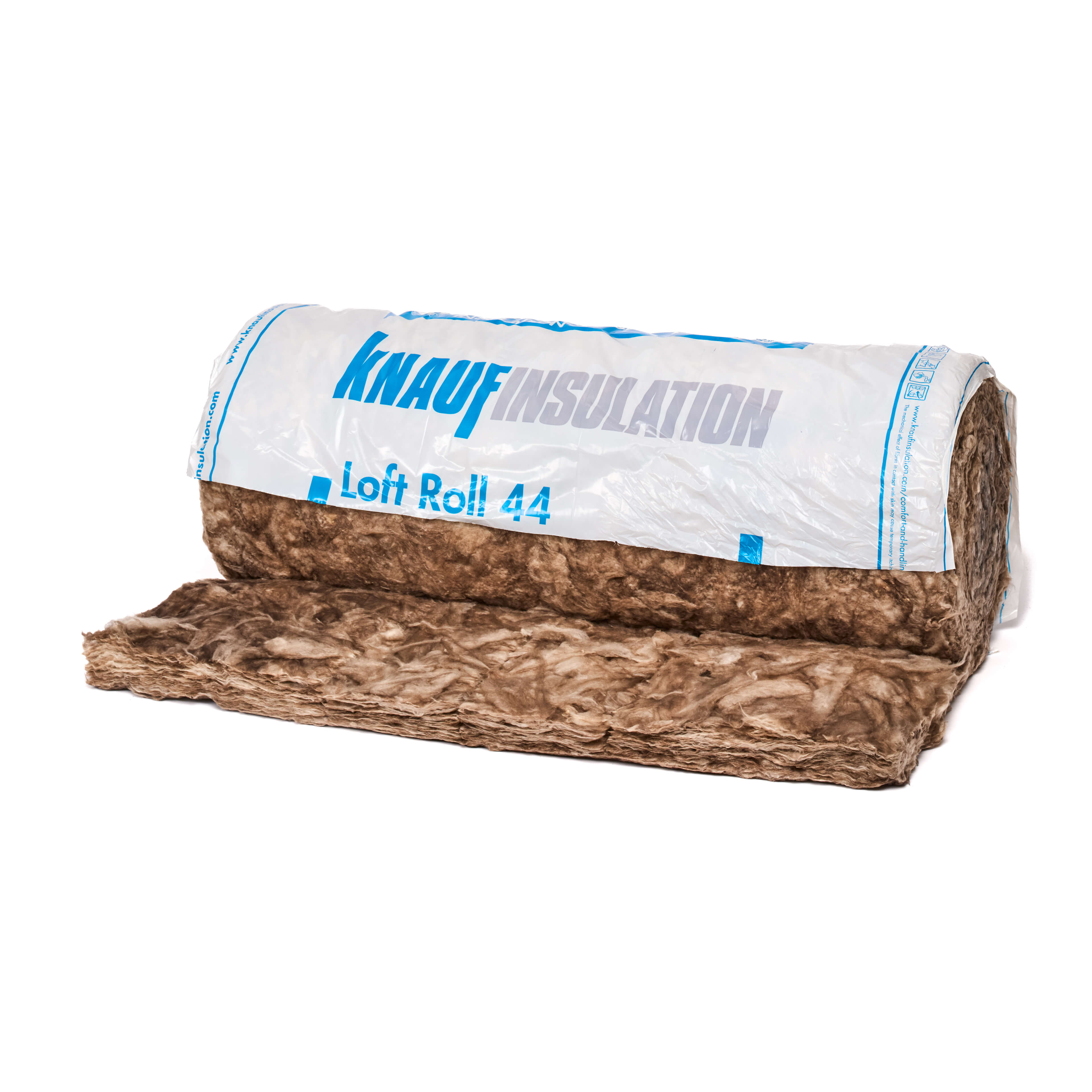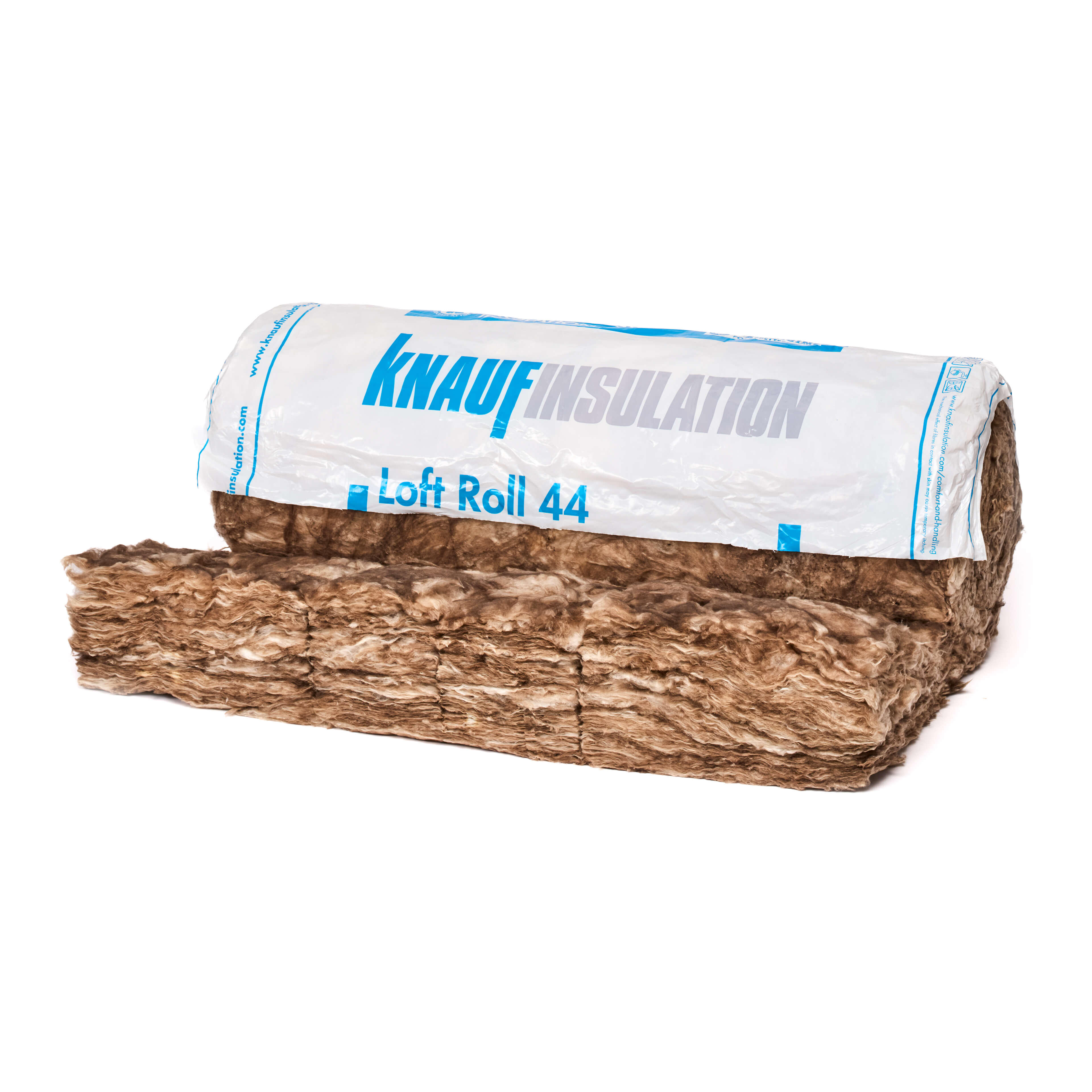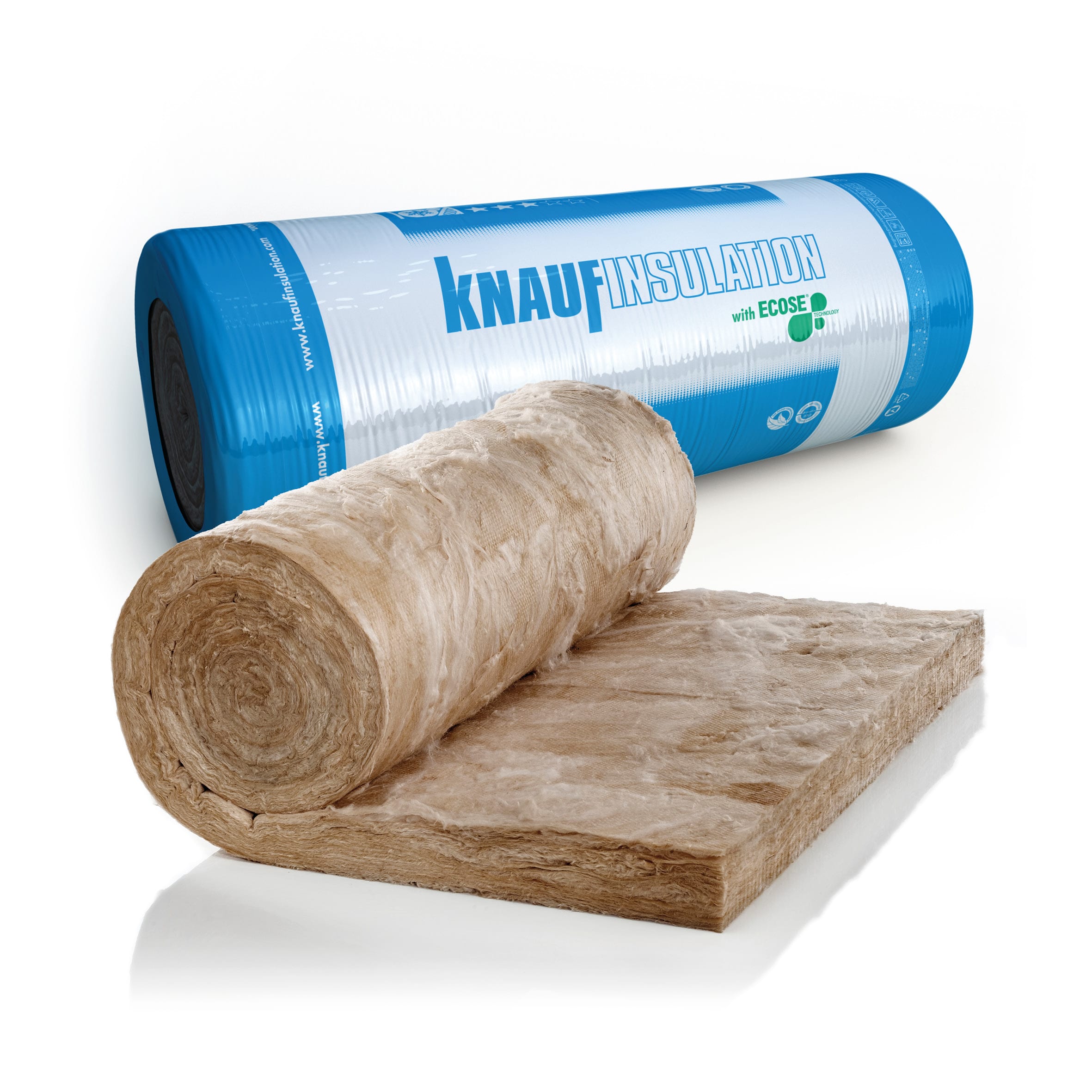Knauf Insulation Roll
(22 Products)Knauf Insulation is a leading UK manufacturer of insulation rolls. Producing from its factory in St Helens, Knauf Insulation has a wide range of roll products to suit many applications. Knauf Insulation Roll is made using glass fibres that are woven together to form a soft wool. They contain Knauf's special ECOSE technology, which makes the rolls softer and less irritable than those of other manufacturers. The two most popular products in the Knauf Insulation roll range are the Loft Roll 44 Combi-Cut and the Acoustic Roll.
What Are Knauf Insulation Rolls?
Knauf Insulation Rolls are large, flexible rolls of glass mineral wool used to insulate buildings. These rolls are distinguished by Knauf Insulation's unique and environmentally conscious ECOSE Technology. This innovative bio-based binder system is formaldehyde-free, resulting in insulation that is characteristically brown, softer to the touch, and generates less dust compared to traditional mineral wool products using conventional binders.
How They Work
The core function of Knauf Insulation rolls is to significantly improve building performance by delivering effective thermal insulation, acoustic sound absorption, and inherent fire safety. Their excellent thermal properties reduce heat transfer, helping maintain comfortable indoor temperatures year-round - warmer in winter, cooler in summer. This leads to substantial energy savings, lower heating bills, and assists in meeting the requirements of UK Building Regulations concerning energy efficiency (Part L).
Beyond thermal performance, Knauf rolls contribute to quieter internal environments by effectively absorbing sound waves. A key safety feature is their fire performance; Knauf glass mineral wool rolls typically achieve the highest possible Euroclass A1 non-combustible rating, meaning they will not contribute to the spread of fire.
Sustainability is a major aspect, with Knauf rolls often containing a high percentage of recycled glass and benefiting from the reduced environmental impact of the plant-based ECOSE Technology binder. This technology also enhances the user experience, making the rolls easier and more pleasant to handle.
Supplied in convenient roll format, Knauf Insulation products are versatile and commonly applied in various parts of a building, including lofts (insulating at ceiling level), internal walls and partitions, and between floor joists.
Benefits
- Excellent Thermal Performance: Knauf rolls effectively trap air, offering low thermal conductivity to significantly reduce heat loss in winter and heat gain in summer, helping to lower energy bills and meet UK Building Regulations Part L (Conservation of Fuel and Power).
- Effective Sound Absorption: The inherent fibrous structure of Knauf mineral wool naturally absorbs sound waves, contributing to quieter and more comfortable internal environments.
- Superior Fire Safety: Knauf glass mineral wool insulation boasts the top Euroclass A1 non-combustible fire performance classification, meaning it won't contribute to the spread or development of fire – a critical safety feature meeting UK Building Regulations Part B (Fire Safety).
- Enhanced Sustainability: Manufactured with high levels of recycled glass (up to 80%), Knauf rolls are bound using ECOSE Technology. This revolutionary plant-based binder is free from added formaldehyde, phenols, or acrylics, uses less energy to produce than traditional binders, and contributes positively to sustainable building assessment schemes (like BREEAM).
- Improved Handling & Health: Due to ECOSE Technology, Knauf rolls are notably softer to touch, produce less dust during cutting and installation, are odourless, and contribute to better indoor air quality due to very low VOC (Volatile Organic Compound) emissions (Eurofins Gold certified).
- Proven Durability: Knauf mineral wool is long-lasting, resistant to rot, mould, and vermin, and non-hygroscopic (resists moisture absorption from the air), ensuring performance throughout the building's life.
- Breathability: The rolls are vapour permeable, allowing moisture vapour to pass through, which helps to manage condensation risk when used within a correctly designed building structure.
Knauf Insulation Roll Types & Their Primary Applications
Knauf Insulation Loft Roll (e.g., Loft Roll 44 / 40)
- Primary Use: Specifically designed for the thermal insulation of pitched roofs at the ceiling level (in 'cold lofts').
- Key Benefit Focus: Maximises Thermal Performance to prevent heat escaping through the roof, delivering significant energy savings and helping achieve Part L U-value targets. The ECOSE Technology makes installation in potentially dusty loft spaces more comfortable due to reduced dust and softer feel. Its A1 Fire Safety rating is crucial for this application.
For detailed technical specifications including certified thermal performance, acoustic ratings and fire classifications, please consult our Knauf Loft Roll page.
Knauf Insulation Acoustic Roll
- Primary Use: Engineered to improve sound insulation performance in internal walls, separating floors, and partition systems.
- Key Benefit Focus: Offers enhanced Sound Absorption due to its specific density, significantly reducing noise transfer between rooms for improved acoustic comfort and aiding compliance with Part E of the UK Building Regulations (Resistance to the passage of sound). The low dust and VOC benefits of ECOSE Technology are particularly advantageous for internal work. Also holds the A1 Fire Safety rating.
For detailed technical specifications including certified thermal performance, acoustic ratings and fire classifications, please consult our Knauf Acoustic Roll page.
Knauf Insulation FrameTherm Roll
- Primary Use: Designed for the thermal insulation of external walls in timber frame construction, fitting between studs.
- Key Benefit Focus: Provides excellent Thermal Performance within the wall structure, contributing to meeting Part L U-value requirements for timber frame buildings. Its dimensions are optimised for a snug friction fit between standard stud spacings. The ECOSE Technology enhances the handling experience for installers working within wall cavities. Offers A1 Fire Safety.
For detailed technical specifications including certified thermal performance, acoustic ratings and fire classifications, please consult our Knauf FrameTherm Roll page.
The Science Inside: Glass Mineral Wool & ECOSE Technology
Knauf Insulation rolls are manufactured from naturally occurring and recycled raw materials (like sand and recycled glass bottles), which are melted and spun into fine, non-combustible fibres. These fibres trap air, giving the insulation its characteristic thermal and acoustic properties.
Key inherent properties of Knauf glass mineral wool include:
- Non-Combustibility: Will not contribute to fire development or spread.
- Thermal Resistance: Trapped air pockets resist heat flow.
- Sound Absorption: The fibrous matrix absorbs sound energy.
- Durability: Rot-proof, non-hygroscopic (doesn't readily absorb moisture from the air), and does not encourage vermin or bacterial growth.
- Vapour Permeability: Allows water vapour to pass through, reducing condensation risk within the building structure when designed correctly.
ECOSE Technology: This revolutionary bio-based binder technology is central to Knauf Insulation's modern rolls. It uses a binder derived from rapidly renewable, natural materials, replacing traditional petroleum-based chemicals (like phenol, formaldehyde, or acrylics). This results in:
- A distinctive natural brown colour (no added dyes).
- Softer feel and improved handling characteristics.
- Significantly reduced dust and volatile organic compounds (VOCs), contributing to better indoor air quality during and after installation.
- Odourless performance.
- Enhanced environmental credentials.
Manufacturing & Composition
Knauf Insulation's glass mineral wool is produced by melting a mixture of silica sand and recycled glass cullet at high temperatures. This molten glass is then spun into fine, resilient fibres. These fibres are bound together using Knauf Insulation's proprietary ECOSE Technology binder, forming a cohesive insulating matrix that is then cured and formed into rolls (or slabs).
Frequently Asked Knauf Insulation Roll Questions
What Are Knauf Insulation Rolls Made From?
Knauf Insulation rolls are primarily made from glass mineral wool. This involves melting sand and a high percentage of recycled glass (often up to 80%), then spinning these materials into fine fibres. These fibres are bound together using Knauf Insulation's unique bio-based binder, ECOSE Technology, which is formaldehyde-free.
How Long Does Knauf Insulation Typically Last? Will It Degrade Or Settle Over Time?
Knauf glass mineral wool insulation is designed to last for the lifetime of the building when installed correctly. It is dimensionally stable, rot-proof, non-hygroscopic (doesn't readily absorb atmospheric moisture), and doesn't provide sustenance for vermin or microbial growth. It should not settle or degrade in performance under normal conditions within the building fabric.
What Happens If Knauf Insulation Rolls Get Wet During Installation Or Storage?
Like most mineral wool insulation, Knauf rolls will lose a significant amount of their thermal performance if they become saturated with water, as water replaces the trapped air which provides the insulation. However, the material itself is generally water-resistant (non-hygroscopic).
If it gets wet, it should be allowed to dry out completely before being enclosed within the structure; it will typically regain its original thermal performance once fully dried. It's always best practice to store rolls under cover and protect them from weather during installation.
If the insulation is repeatedly soaked or stays wet for a long time (like from a leak), it could eventually become damaged, compressed, or promote mould growth on surrounding materials, even if the insulation itself doesn’t mould easily.
Short-term wetting is usually not an issue if it fully dries, but it’s always better to protect it from getting wet in the first place.


















